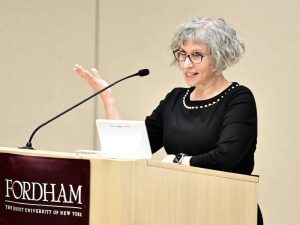
“Going through this adventure with my daughter has taught me what it means to be truly human,” said Martone, who spoke at the Rose Hill campus on Nov. 9. “The time I sat by her … when she was comatose was the most meaningful time of my life. It made me realize that persons with disability are discriminated against—not because of who they are, but because of who we are and what we wrongly value.”
Martone is an associate professor emerita of moral theology at St. John’s University in Jamaica, New York. She is the recipient of several awards, including a National Endowment for the Humanities grant on “Justice, Equality, and the Challenge of Disability” and a fellowship on disability ethics from Weill-Cornell Medical College and the Hospital for Special Surgery. She wrote and published Over the Waterfall, a memoir of her daughter’s accident, in 2011. Since retirement, she has worked with Ladies of Charity USA to establish a national homecare agency. In 1995, Martone earned her Ph.D. in moral theology from Fordham’s Graduate School of Arts and Sciences.
In her lecture “From Trauma to Disability: Examining Our Cultural Values,” Martone offered an emotional account of her daughter’s journey from her perspective as a mother and caregiver. In addition, she spoke about the shortcomings of America’s health care system and how our societal values marginalize those with disabilities.
A Health Care System That Neglects People Living with a Chronic Condition
On February 22, 1998, an elderly woman lost control of her car and hit several students from the University of Chicago, including Michelle. For nearly eight months, Michelle was unconscious. She had 10 brain surgeries, a respirator, and a feeding tube inserted into her stomach, said her mother—and she nearly died a few times.
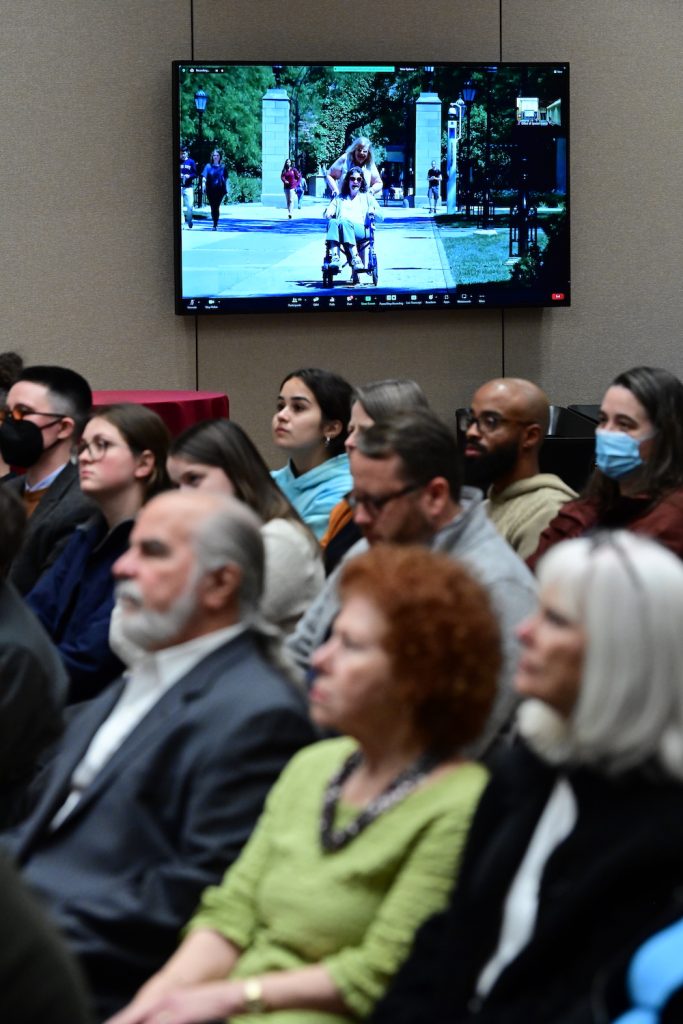
Today, Michelle continues to live at home. She is able to use a walker to move around, answer her email, play games on her computer, and even go horseback riding, with the help of her family members and professionals. In 2016, she celebrated her 40th birthday with family and friends.
But during the two years following the accident, her family experienced a difficult journey through the health care system. When Michelle’s doctors determined that she would not be restored to independence in a short period of time, her care became less important to the system, said Martone. Everyone in the intensive care unit received the same level of care based on their needs, but those who left the facility without the possibility of a full recovery experienced disparities in care, she said. For example, she was able to get all the MRI scans she needed for her daughter, but after she left the hospital, it was difficult to find home care workers and therapists.
Michelle was discharged from one facility to another, including large research hospitals that underwent frequent changes in residents and staff, said Martone. In the process, Martone discovered that on her daughter’s medical records, someone had falsely written that she had undergone a lobotomy procedure.
When Michelle finally awoke, she began to make progress, but it wasn’t fast enough for her insurance companies, said Martone. “If a patient doesn’t respond quickly, she’s documented as having plateaued and services are cut back and soon eliminated,” said Martone.
Eventually, Michelle needed to move back home or into a nursing home. Thanks to money earned from a major lawsuit, they were able to afford the former, along with personalized care. Her condition improved with time and the help of professionals and close family members. But insurance only covered a few hours of daily nursing care, and Michelle needed round-the-clock care.
Too Much Emphasis on Independence
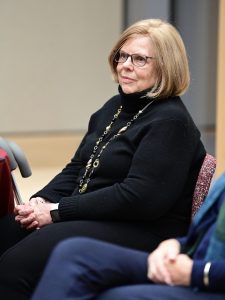
Throughout this experience, Martone said she has learned that people with chronic conditions, especially those who can no longer live independently, are neglected by the health care system.
This speaks to a deeper problem embedded in the U.S., she said. Our society overwhelmingly favors independence and often rejects dependency. Many of us live in a world where we think we are independent because we can buy whatever products or services we need. But that isn’t true, she said. Even the able-bodied all rely on people and services.
“We delude ourselves into thinking we are independent. Our health care system also favors this approach. … It puts vast resources into keeping people alive and returning them to independence and few resources into teaching people how to die or live with a chronic condition,” she said, including the 1.7 million Americans who have a traumatic brain injury. “We have to give chronic care more serious thought … [and]do something about the fragmentation of our health care system,” Martone said.
‘I Am So Much More Than What You See’
Dealing with the health care system was difficult, but the hardest thing for her to experience as a mother was discrimination against her daughter, she said.
“There were so many places where we were made to feel unwanted. Her friends drifted away, and her world was reduced mostly to her immediate family and her paid caregivers and therapists,” said Martone.
Martone showed the audience a scene in the documentary “Your Health: A Sacred Matter,” aired on PBS, where her daughter sings about her desires in a song that she composed herself: “I am so much more than what you see. There is so much more inside of me. A sense of humor and gratitude for life. … You may think I’m less of a person, only because you see I can’t walk. But if you took the time, you would know I could talk. Could you stop a moment and say hi?”
Martone said we need to do more to accommodate persons with disabilities: “We need to stop viewing our work with them as acts of charity on our part and recognize our interdependence. They are not here to make us feel good about ourselves. They are us.”
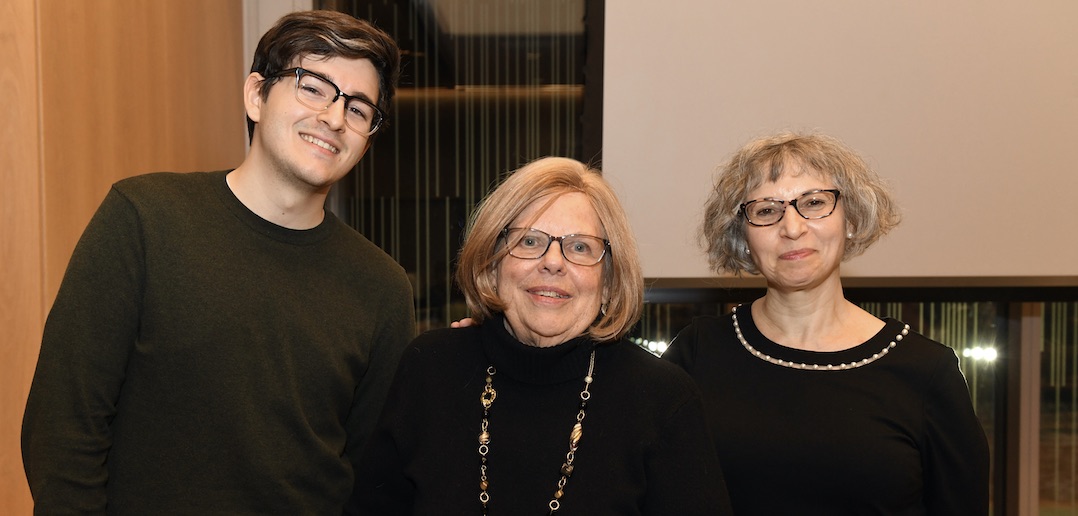
“Identifying and doing what is ethical in a digital society will require deep, honest, selfless thinking,” Allen said in an appearance at Fordham’s Lincoln Center campus on March 7.
“We are drawn to technology like moths to a flame. We risk hurting ourselves. We also empower ourselves to hurt others.”
Allen, the Henry R. Silverman professor of law, professor of philosophy, and vice provost at the University of Pennsylvania, delivered her lecture, “Ethics and Digital Life,” as part of the Graduate School of Arts and Sciences’ Gannon lecture series.
The lecture, which focused on the ethical implications of data mining and social media on people, was also part of a series of events celebrating the 20th anniversary of Fordham’s Center for Ethics Education, which co-sponsored the evening.
A Crisis of Confidence in Big Tech
In her talk, Allen noted that the public mistrust in organizations that harvest and store our data has reached crisis levels. American lawmakers have been slow to recognize this, but the European Union has not, Allen said, as evidenced by the fact that it invited her to speak in October at its annual conference on data privacy, the same day as Apple CEO Tim Cook.
“I really applaud the E.U. for its effort to bring ethics to the fore,” she said. “As a global community, we cannot afford to go mindlessly wherever technology innovators and adaptors may choose to drag us.”
Although it was written over 2,000 years ago, Plato’s story Ring of Gyges is worth considering as we contemplate these issues, Allen said. In the story, a shepherd named Gyges discovers a ring that grants him invisibility. He uses it to seduce a king’s wife, have the king killed, and finally take the place of the king himself.
“I think about the myth of Gyges a lot, because I actually believe that when we put technology in the hands of human beings, we presume that they will use that technology for good,” she said.
“We should presume there will be an awful lot of not-good uses, as well as a lot of accidental problems like data breaches or data leaks that no one intended.”
Our Own Ethical Responsibilities
Although it is impossible for us to control every aspect of our digital lives, she suggested that we all have five ethical responsibilities: In addition to supporting ethical, effective laws regarding data privacy, she said, we should also support corporate digital ethics and accountability, stand behind technology and ethics education at all levels, and work to advance nonprofit and civil society organizations that champion data security and ethics.
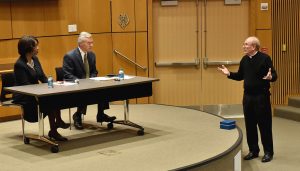
And perhaps most importantly, we should mind our own behaviors to make sure we’re respecting our own privacy as well as that of others.
“To me, privacy is a very important good that has a relationship to respect and self-respect,” she said.
“Individuals of moral character will moderate their sharing, and will be mindful about the extent to which their virtues like reserve and prudence might be at stake when they engage in digital life, whether it’s using social media, using credit cards, using or not using passwords, encryption, security software, and so forth.”
There are some reasons for hope, she said. In a landmark 2017 court case, for instance, the Supreme Court in India ruled for the first time that citizens there had a fundamental right to privacy. The decision, which came in response to a lawsuit related to the country’s biometric national ID—known as the Aadhar card—cited Allen and several American colleagues in its written opinion. This led in turn to a unanimous decision of the country’s top court last year to overturn a colonial-era ban on consensual gay sex.
Allen also praised the European Union’s General Data Protection Regulation (GDPR), which was passed last year, for codifying a “right to be forgotten” that people can use to petition search engines to expunge embarrassing information about themselves from search results. In the United States, privacy laws exist to protect health data (HIPA) and education data (FERPA), so it stands to reason that other forms of personal information should be protected, she said.
“It’s not that America doesn’t have a lot of privacy laws. The problem is a lot of our privacy laws are out of date and narrow,” she said, noting that the last major overhaul to U.S. telecommunications law was in 1996.
Think of the Future
Ultimately, she said, it’s up to us to embrace what she called a “quotidian practice” of a commitment to privacy values, which are important because they’re linked to ideals of freedom and dignity and they’re important for forming independent, self-respecting individuals.
“If we just completely give up on the idea of privacy now, we might wake up and discover in 20 years from now that we wish we hadn’t,” she said.
“I’m not saying to anybody, you shouldn’t do 23andMe and you shouldn’t have an Alexa. What I’m saying, is, if you have 23andMe and Alexa and you live your life on Twitter and Facebook and Instagram, and you have one of those 24-hour web cameras in your house where you’re on YouTube all day long—if you’re living in the panopticon, then you’ll have a problem.”
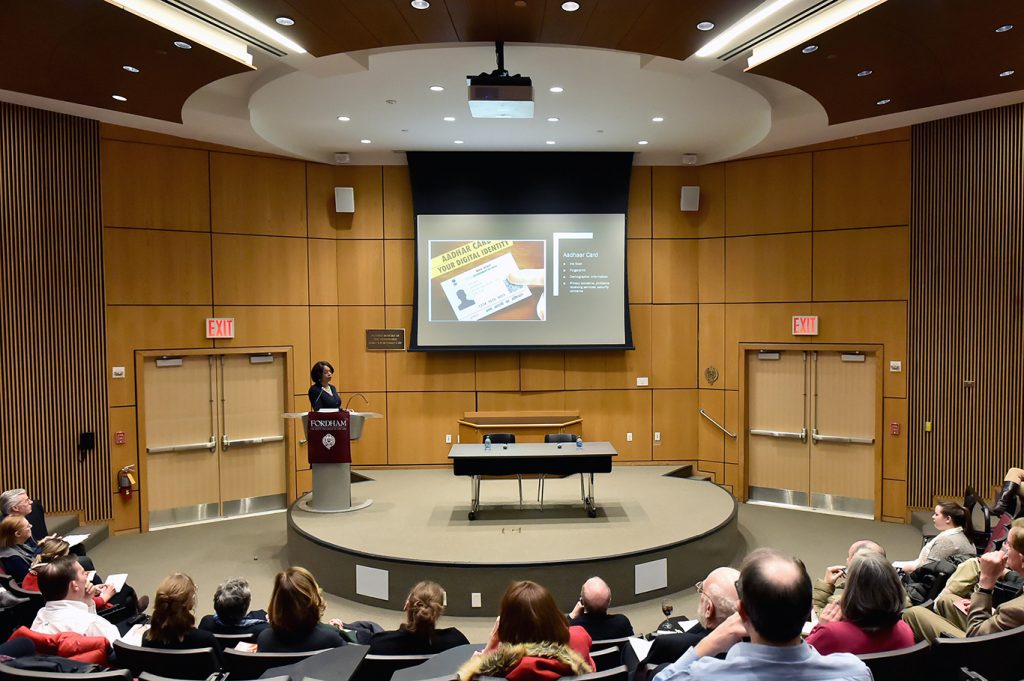
Nevertheless, the best chance the country has for resolving its worsening problem of income inequality is to embrace a fair and responsible free enterprise system, said this year’s Gannon lecturer on April 26.
In a recent New York Times opinion piece and again at Fordham, Peter A. Georgescu, chairman emeritus and former CEO of Young & Rubicam, stressed that income inequality in America has reached crisis level.
Moreover, the inequality of opportunity that it produces among young women and men has dire social consequences: steep high school dropout rates; abysmal college prep; nonexistent early childhood education; single-parent homes; drug and alcohol abuse; high unemployment; trauma and stress-related conditions; and a dramatic drop in life expectancy.
The quickest and most effective solution to the crisis is capitalism, Georgescu said in his talk, “Capitalists Arise! Income Inequality in America Today,” hosted by the Graduate School of Arts and Sciences.
“Free market capitalism has done amazing things for this country and for the world. … Hundreds of millions of people have been lifted out of poverty,” said Georgescu, a child survivor of a Romanian labor camp and no stranger to deprivation and hardship.
“It has made America a leading economic and military force in the world, and just after the Second World War through the mid-1970s, it built the greatest middle class and the greatest economic market the world had seen.”
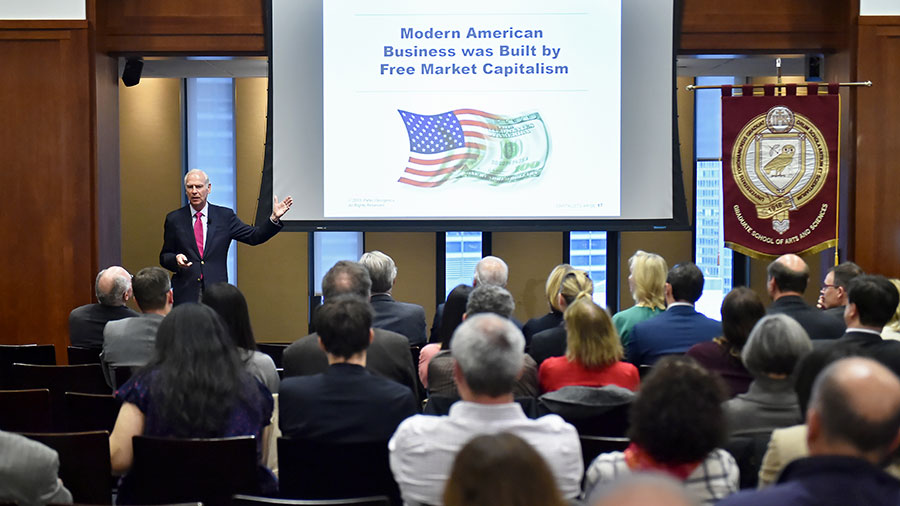
Photo by Dana Maxson
Free market capitalism, as it was originally imagined, revolves around five key stakeholders: customers; employees; company shareholders; the corporation itself; and the community in which the corporation does business. Georgescu offered as an example the Johnson & Johnson Credo, crafted in 1943 by former chairman Robert Wood Johnson, which Georgescu said epitomizes the priorities of capitalism.
The goal of business in a capitalist society is simple, he said—create jobs and pay fair wages, and do so while attending equally to these five constituencies.
However, this is not the capitalism that we know and operate within today, Georgescu said. Capitalism has gone awry due in part to thinkers such as Milton Freeman, who in 1980 stated that the “real purpose of business is to increase shareholder value.” Since then, corporate priority has shifted from five key stakeholders to just one, creating a system that Georgescu called “shareholder primacy.”
Research data support this trend, he said: Over the last 40 years, wages have flat-lined, while profits and shareholder returns have steadily increased. Currently, 90 percent of private corporations’ profits go to shareholders.
To further destabilize the system, the current ratio between CEO salaries and average employee wages is about 600 to 1, Georgescu said. CEOs, meanwhile, are beholden to shareholders’ demands, as they are constantly under the threat of “deliver or get fired”—a threat that is not remote, given that the average tenure of a CEO is under four years.
The solution is not, as some have suggested, a redistribution of wealth, whether through punitive taxation or social unrest (the latter of which would be more akin to a “redistribution of poverty,” he said).
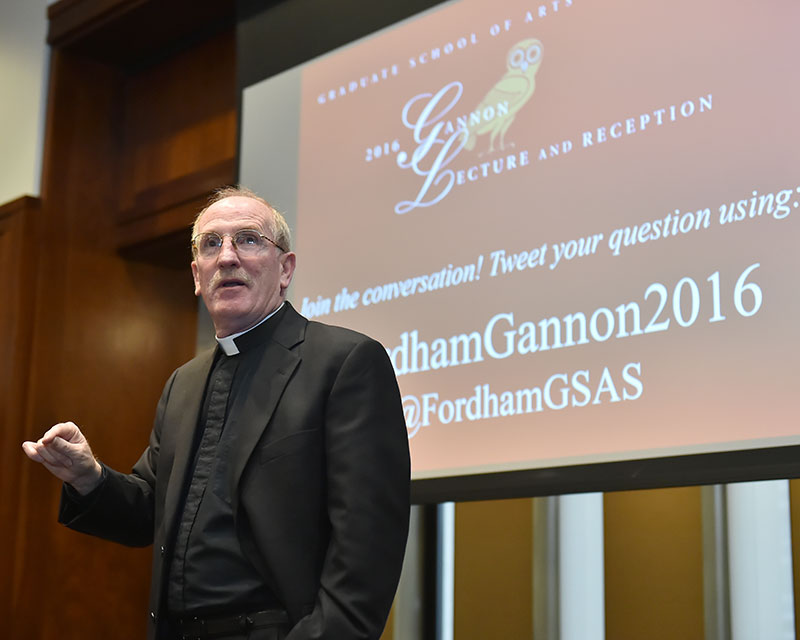
Photo by Dana Maxson
Rather, the solution is to end the culture of shareholder primacy and return to a model that prioritizes all five key stakeholders—especially employees.
“Who are the real value creators? Where do the ideas come from? The employees. So, the employees must get fair wages,” he said.
“Free enterprise can work. The profit motive is very effective. But the profits have to be channeled the right way. You have to share the pie. Let free enterprise create a bigger and bigger pie, but then make sure you share the bounty. … It has worked before and it can work again.”
Inaugurated in the fall of 1980, the Gannon lecture series brings distinguished speakers to Fordham to deliver open lectures on topics of public importance. The series is named for Robert I. Gannon, SJ, former president of Fordham.
]]>
Photo by Chris Taggart
In an unusually personal address about the diplomatic corps, Ambassador Anne Anderson, Ireland’s representative to the United Nations and the United States, pulled back the curtain on the inner workings of U.N. elections.
Anderson, a visiting member of Fordham’s faculty, presented the observations on April 18 at the Graduate School of Arts and Science’s (GSAS) Gannon Lecture, titled “United Nations Elections: Power, Influence, Reputation.”
“For us diplomats, even more so than in most other walks of life, the personal and the professional are intertwined,” said Anderson.
She called her fellow diplomats “itinerants” whose common bond is often the transient nature of their profession. One way to gage the strength of such friendships, she said, was in the manner in which colleagues vote during U.N. elections.
“Despite undoubted blemishes, the United Nations will always continue to speak to what is best in all of us,” she said.
Anderson first focused on the U.N. “non-elections”—the unelected permanent members of the Security Council, known as the P5: the United States, Russia, China, the United Kingdom, and France. She said their position on the 15-member council, which provides them with higher status and veto power, was an anachronism spawned in long-gone war and is in “urgent need of reform” to balance out power.
Ireland, she said, was elected to a two-year term on the Security Council in 2000 and elected to the Human Rights Council (HRC) in 2012. The HRC is experiencing a growing clout, she said, as a result of a stagnant Security Council held back, in part, by a fractured relationship between two permanent members: the United States and Russia.
Nevertheless, the 10 rotating seats on the council remain a plum prize, with U.N.-member nations spending an increasing amount on campaigns for those seats. In 2000, Ireland spent nearly $1.2 million, while Australia spent upwards of $25 million. It’s a trend that concerns the ambassador.
“If extravagant spending becomes the norm, it follows that those with deep pockets will be advantaged and those with limited resources will be edged out,” she said.
Over recent years, she said, there has been developing “an increasingly pronounced sense of entitlement on the part of large states.”
While smaller states such as Ireland have a level of voting solidarity through the Forum of Small States, their sway often comes through personal contacts and influence, she said. Through a process called “reciprocals,” an agreement is made between two diplomats where one diplomat will vote for the other’s cause in exchange for support later.
“Power speaks with a loud voice, influence adopts a softer tone,” she said.
She noted that influence often gave the smaller states an edge.
“Attraction can have quite a complex chemistry, but it is essentially built on liking and respect,” she said. “Neither of these sentiments can be switched on in the course of a campaign, both are normally built up over time.”
Anderson referred to a nation’s reputation, especially in building such personal relationships, as “a brand of currency.” She added that a certain empathy for Ireland’s story of emergence from colonialism “chimes with that of so many others.”
She also mentioned another Irish factor that resonates to this day, “especially in this Fordham setting.”
“Irish diplomats are the legatees and beneficiaries of the work done by Irish missionaries,” she said.
The Gannon Lecture is delivered in the fall and spring of each year and is named for Robert I. Gannon, S.J., president of Fordham from 1936 to 1949.
]]>
Under the guidance of his mentor, John Entelis, Ph.D., professor of political science and director of the Middle East studies program at Fordham, Azari tore up his original thesis and turned to the Iranian Revolution.
“After the revolution, I was active in promoting democracy in Iran,” said Azari, who immigrated to the United states in 1970 and later earned a master’s degree in engineering at Polytechnic University (now part of NYU). “There were times when we came in conflict with the current regime. I devoted my time to learning about the alliance of social forces that caused the revolution and how these forces could possibly lead to a democratic system.”
After earning his doctorate in political science at Fordham in 1988, Azari worked as a visiting scholar at the University of California, Berkeley. He started his own engineering and development firm, which he ran for more than two decades while continuing to study the unfolding events in Iran. And in 1989, he and his wife, Pari, opened Azari Vineyards, a winery in Sonoma County. He produces pinot noir and a secondary crop of cool-climate shiraz, a nod to his Persian heritage.
When he’s not running the vineyard, Azari is working on a book about democracy and government. In it, he and his co-author, a colleague at Stevens Institute of Technology, argue for a return to community government.
“We’re proposing this model of government that may be futuristic,” he said, “but it would be based on the problems that the Founding Fathers could not have foreseen 220 years ago. The country has changed a lot.”
The book fits in nicely with Azari’s lifelong pursuit of figuring out how the world works—whether it’s from an engineering, horticultural, or historical perspective.
“I really enjoy understanding history and social changes,” he said, “and how those changes contribute to the creativity of individuals.”
It also allows him to think deeply about the complicated politics of his native country, analyzing what he calls “the narrow narrative that exists in Iran.”
A proud Fordham alumnus, Azari hosted a 2009 reception at his winery for members of the University’s Northern California Alumni Chapter. And this spring, he returned to Fordham to participate in the 2012 Spring Gannon Lecture with his mentor and friend Entelis, sharing with the Fordham community his thoughts about Iran, the Arab Spring, and the Middle East.
“I’ve been sharing with Fordham like a community, like a family,” he said. “You feel a certain affinity, a certain connection with Fordham graduates.”
]]>The Czech-born Matuštík, who is a professor of philosophy at Purdue University, outlined his notion of radical evil during an hourlong presentation in which he argued that what he called a “post-secular” world has left many inured to such depravity and cruelty.

“We have lost the language to speak about the types of cruelty and wanton violence that occurred in the 20th century, as well as in our own century,” Matuštík said. “And so the question is: Should we give up the notion of evil all together? What are we supposed to do in Kosovo, in Sarajevo, in Guatemala, in future Darfurs and in those villages where humans have raped women and killed their neighbors and the U.N. or the European Union tells the victims to move back to those villages and live with each other? We do not have the political means to legislate forgiveness. We do not have the language and political means to bring about answers to such questions.”
Matuštík also argued that in order to fully grasp radical evil, it must be understood as a religious phenomenon in that those who perpetrate such cruelty are imbued with a kind of inverse religiosity: instead of hope, despair, instead of love, hatred. “Radical evil of this sort is oriented toward something more than physical destruction, it is orientation toward the destruction of the spirit,” he said.
A widely regarded scholar, Matuštík received his doctorate from Fordham University and is author ofDiscontents of Our Times: Essays About Radical Evil and Other Anxieties of Today (Academy of Sciences of the Czech Republic, 2006), Jürgen Habermas: A Philosophical-Political Profile (Rowman & Littlefield Publishers, 2001) and Specters of Liberation: Great Refusals in the New World Order (SUNY Press, 1998). His address, “The Scarcity of Hope: Post-Secular Meditations on Radical Evil,” is based on a book he will publish in 2008 on the subject, Radical Evil and the Scarcity of Hope: Postsecular Meditations.
The Gannon Lecture, which began in the fall of 1980, brings distinguished individuals to Fordham, to deliver public lectures on topics of their expertise. Fordham alumni endowed the series in honor of Robert I. Gannon, S.J., president of Fordham from 1936-1949.
]]>A widely regarded scholar, Matuštík received his doctorate from Fordham University’s and is author ofDiscontents of Our Times: Essays About Radical Evil and Other Anxieties of Today (Academy of Sciences of the Czech Republic, 2006), Jürgen Habermas: A Philosophical-Political Profile (Rowman & Littlefield Publishers, 2001) and Specters of Liberation: Great Refusals in the New World Order (SUNY Press, 1998).
The Gannon Lecture, which began in the fall of 1980, brings distinguished individuals to Fordham, to deliver public lectures on topics of their expertise. Fordham alumni endowed the series in honor of Robert I. Gannon, S.J., president of Fordham from 1936-1949. The event is free and open to the public.
]]>Quinlan, who is a Fellow at the Center for Transatlantic Relations at the Paul H. Nitze School of Advanced International Studies of Johns Hopkins University, has published three books and more than 125 articles on international economics and trade. The lecture is free and open to the public, but seats are limited. To R.S.V.P. call (718) 817-4964 or email
[email protected].DATE: THURSDAY, FEB. 16
TIME: 4 P.M.
PLACE: FLOM AUDITORIUM
WALSH LIBRARY, ROSE HILL CAMPUS
BRONX, NEW YORK
The Gannon Lecture Series, which began more than 20 years ago, brings distinguished individuals to Fordham University to deliver public lectures. It is named in honor of the late Rev. Robert I. Gannon, S.J., president of Fordham from 1936 to 1949.
]]>Corrigan, who earned his M.A. (1965) and Ph.D (1971) from Fordham’s Graduate School of Arts and Sciences, has been a managing director at Goldman Sachs since 1994. He is co-chair of the firm’s Risk Management Committee and vice chair of its Business Practices Committee. Prior to joining Goldman Sachs, he was president and chief executive officer of the Federal Reserve Bank of New York.
DATE: TUESDAY, FEB. 7
TIME: 6 P.M.
PLACE: MCNALLY AMPHITHEATRE
LINCOLN CENTER CAMPUS
140 W. 62nd ST., NEW YORK, N.Y.
The lecture is free and open to the public, but seats are limited. To R.S.V.P., call (718) 817-4615 or email
The second installment of the 2006 Gannon Lecture Series will bring Joseph Quinlan, managing director and chief market strategist at Banc of America Capital Management, to Fordham on Thursday, Feb. 16. Quinlan, who earned an M.A. from Fordham’s Graduate School of Arts and Sciences in 1984, will discuss America’s role in the world economy. The lecture is free and open to the public, but seats are limited. To R.S.V.P. call (718) 817-4964 or email
[email protected].The Gannon Lecture Series, which began more than 20 years ago, brings distinguished individuals to Fordham University to deliver public lectures. It is named in honor of the late Rev. Robert I. Gannon, S.J., president of Fordham from 1936 to 1949.
]]>“There is a clear threat to our basic intellectual freedom and the age of enlightenment in the United States because [scientists]are not allowed to research embryonic stem cells,” said Sidney Altman, Ph.D., professor of cell, molecular and developmental biology and of chemistry at Yale University. “This is the first time a law has been prepared that will prevent us from investigating legitimate scientific interests.”
Altman, who won the Nobel Prize in chemistry in 1989 for discovering catalytic RNA, delivered the Graduate School of Arts and Sciences’ annual Gannon Lecture on Feb. 16 in Flom Auditorium on the Rose Hill campus.
Debate over using embryonic stem cells for research began early in President Bush’s first term, when he banned federal funding for such research. The ban stemmed from the president’s belief that the embryos from which the cells were derived represented human life and from concern that such research could lead to human cloning. In 2001, the president allowed scientists working in government labs to conduct research using 72 existing lines of stem cells. But by 2003, most of those cells were exhausted.
Altman stressed that there is “zero interest” among scientists in using embryonic cells to make human clones, and he is not sure it is even possible. Instead, he said that the research would be used to investigate cures for diseases such as Parkinson’s, Alzheimer’s, heart, diabetes and certain types of cancer.
The Gannon Lecture Series, which began in the fall of 1980, brings distinguished individuals to Fordham to deliver public lectures on topics of their expertise. It is named in honor of Robert I. Gannon, S.J., president of Fordham University from 1936 to 1949.
]]>The Gannon Lecture brings distinguished individuals to Fordham to deliver public lectures in honor of the late Rev. Robert I. Gannon, S.J., president of Fordham from 1936-1949. Professor Sandel is an Oxford Rhodes Scholar who has published several books in recent years, including Democracy’s Discontent: America in Search of a Public Philosophy and Liberalism and the Limits of Justice. Sandel said many people object to the marketplace being associated with human reproduction (sperm and egg selling, commercial surrogacy and baby selling) because of the economic gap between the rich and the poor.
Some fear the poor will be unfairly coerced by the necessity of their situation to sell what they otherwise would not. Sandel’s lecture went far beyond the commodification of sexual reproduction, as he also discussed how military service and voting are corrupted when the economic forces of the market are applied. “Military service is an obligation and to turn it into a commodity, a job for sale, is to deny its pure civic responsibility,” Sandel said. “If it’s all about the market, why shouldn’t the U.S. military be open to foreigners? Or, why shouldn’t it be liable to subcontractors and privatization?” Sandel said the market also works to the detriment of our political system.
He noted a Web site (www.voteauction.com) that enabled interest groups to pay registered voters for their votes in the 2000 presidential election. The site offered Florida voters $11.61 for their votes, and 540 Floridians took advantage of the offer, he said. This demonstrates that the 2000 presidential election was determined by money, he said. Sandel concluded his lecture with a plea to end this rampant commodification in society. “Freedom does not consist of the choices people make within the market,” Sandel said. “There are moral and civic goods that markets do not honor and money cannot buy.”
]]>